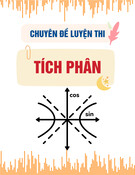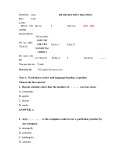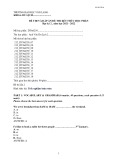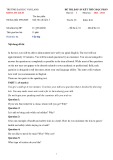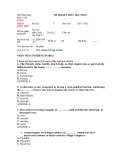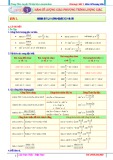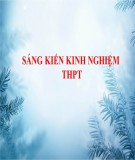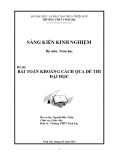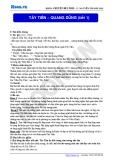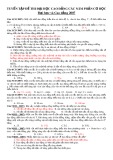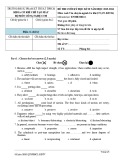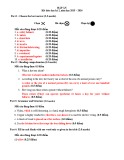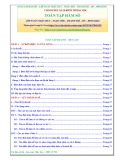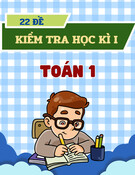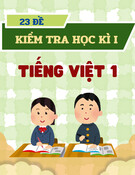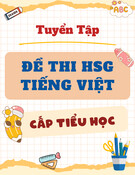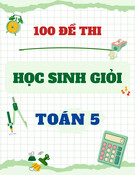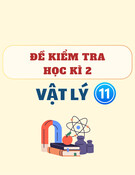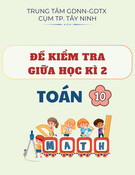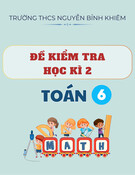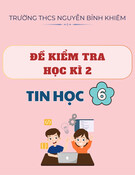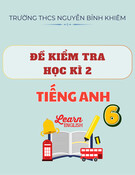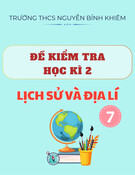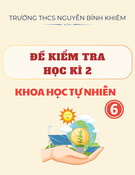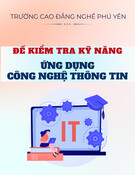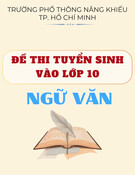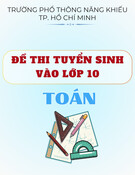ÑEÀ SOÁ 24 TRÖÔØNG CAO ÑAÚNG SÖ PHAÏM BEÁN TRE – NAÊM 2003 MOÂN : TIEÁNG ANH – KHOÁI D (Thôøi gian laøm baøi : 180 phuùt)
c. man c. tower c. sound c. chemistry c. opens b. flame b. town b. should b. cheese b. cuts d. fame d. slow d. found d. cherry d. plays
Caâu 1: Ngöõ aâm (1 ñieåm) Choïn töø coù phaàn gaïch döôùi ñöôïc phaùt aâm khaùc vôùi caùc töø coøn laïi trong moãi nhoùm. 1. a. name 2. a. how 3. a. count 4. a. check 5. a. smells Caâu 2: Ngöõ phaùp (3 ñieåm) Choïn moät töø hoaëc nhoùm töø ñuùng nhaát trong soá a, b, c, d ñieàn vaøo khoaûng troáng cuûa moãi caâu.
c. repaired b. repairing d. being repaired
c. us writing b. us to write d. us to writing
b. will has checked c. will have checked
b. wouldn’t fail c. won’t fail
b. yet he failed d. he failed
b. Meanwhile d. he failed
c. doing b. to do
b. as if c. if
b. I am so astonished d. I am too astonished
1. I’d to have my shoes …………………… at once. a. repair 2. The teacher encouraged ………………………… good compositions. a. us write 3. All planes ……………………… before departure. a. will checked c. will be checked 4. If he hadn’t wasted too much time, he …………………………… in his examination. a. would fail c. wouldn’t have fail 5. Although he tried hard, ……………………… a. but he failed c. however he failed 6. …………………………… the rise in unemployment, people still seem to be spending more. a. Nevertheless c. Despite 7. we were made …………………………… all the cleaning in the house. a. do d. done 8. It’s very cold in here. Do you mind ………………… I close the window? a. Whether d. for 9. …………………………… that I can’t think of anything to say. a. I am too astonishing c. I am very astonished 10. Hardly ………………………… attack people.
d. snaked have c. snakes to b. do snakes
b. is he d. isn’t he
b. less c. none
b. What terrible d. What a terrible
c. although d. so that b. if
c. having b. has d. going to have
a. have snakes 11. He seldom goes fishing ……………………………? a. doesn’t he c. does he 12. I want some water, but there is …………………………… left in the bottle. a. no d. any 13. ………………………… weather! We can’t go out for a walk now. a. How terrible c. How a terrible 14. She spoke quietly to him …………………………… nobody else could hear a word. a. because 15. Each of you ……………………………… a share in the work. a. have Caâu 3: Töø vöïng (1 ñieåm) Söû duïng daïng ñuùng cuûa töø trong ngoaëc ñeå hoaøn thaønh toát nhaát caùc caâu sau. 1. Motor-racing is an extremely ……………………………… sport. (RISK) 2. The room is too narrow. It needs …………………………… (WIDE) 3. The ……………………………………… of the building has shocked a lot of people.
(DESTROY)
4. She always listens …………………………… to what she is told. (ATTENTION) 5. Vietnam declared its ……………………………… in 1945. (DEPEND) Caâu 4 : ÑOÏC HIEÅU (3 ñieåm) A. Ñoïc ñoaïn vaên döôùi ñaây vaø choïn moät töø thích hôïp trng khung ñeå ñieàn vaøo moãi khoaûng troáng coù ñaùnh soá. Vieát caùc caâu vaø töø thích hôïp vaøo giaáy laøm baøi.
Plenty Smaller Which compared directly for need without whether wish barter with
Money is something we take for granted in our lives. Some of us (1) ………………………
we had more of it, but we all recognize it when we see it, (2) …………………………… in the forms of coin, notes, or cheques. It is difficult to imagine how people manage (3) ………………… money. In the earliest period of human history, people used to exchange goods (4) …………………………… They would exchange things they had (5) ………………………… of for things they were in (6) ……………………… of. For example, they might offer food (7) …………………………… tools. This method of exchange, which is known as (8) ………………………, has many disadvantages. Certain goods may be difficult to carry; they may not last long,
or maybe impossible to divide into (9) …………………………… units. It can also be very difficult to know the worth of something (10) …………………………… with other goods.
Michael Faraday, an English experimental physicist, was the son of a poor
B. Ñoïc ñoaïn vaên sau vaø traû lôøi caùc yeâu caàu beân döôùi cuûa baøi ñoïc. blacksmith. After very little schooling he was apprenticed to a bookbinder. The boy worked hard all day and studied at night. One day a man a entering the shop found a boy at work binding an encyclopedia, and at the same time studying hard at the article on electricity in it. The man was surprised to see the boy so interested in a very difficult subject and questioned him. He found out that Faraday, working late at night, had already been making experiments of his own, though he was too poor to possess anything but a home-made battery! When a man gave him four tickets for the lectures which Sir Humphry Davy was then delivering at the Royal Institute, the boy was as much delighted as if someone had given him a fortune. He went to the lectures and made notes of what he heard. At the end of the lectures, he sent his notes to the great scientist and asked him for work. Later, Davy made him his assistant. This began his scientific career. Vieát T (True) neáu caâu sau ñaây ñuùng vôùi baøi ñoïc, hoaëc F (False) neáu caâu sau ñaây khoâng ñuùng vôùi baøi ñoïc. Vieát soá caâu vaø T ( true) hoaëc F (False) vaøo giaáy laøm baøi. 1. Michael Faraday worked as a bookbinder when he was young. 2. While working at the bookbinder’s shop, he paid much attention to electricity. 3. He was too poor to make experiments of his own. 4. He was very happy when he was given the tickets for Davy’s lectures. 5. He was not given a chance to work for Davy. Caâu 5: Vieát (2 ñieåm) A. Duøng caùc töø hoaëc nhoùm töø gôïi yù vieát thaønh caâu hoaøn chænh. Ghi caùc caâu ñaõ
hoaøn chænh vaøo giaáy laøm baøi.
I’d rather ...........................................................................
1. we/ better not/ throw/ rubbish/ the streets. 2. football/ seem/ be/ most popular game/ England. 3. it/ wrong/ you/ not/ help/ him/ studies. 4. catch/ many fish/ that/ couldn’t count. 5. read/ the book/ he/ return it/ library. B. Hoaøn thaønh caùc döôùi ñaây sao cho caâu sau coù cuøng nghóa vôùi caâu tröôùc. 1. John missed the ferry because his car broke down. - If ........................................................................................ 2. Women in developed countries no longer bear many children. - No longer ........................................................................... 3. I prefer Vietnamese food to English food. - 4. Peter can run faster than I. - I can’t ................................................................................
5. “I think you should look for a better job” Jill said to Alison. - Jill advised .........................................................................
5. b 1. c 4. c 2. d 3. b
5. d 10. b 15. b 1. c 6. c 11. c 3. c 8. c 13. b 4. c 9. b 14. d
3. destruction
1. risky 4. attentively 2. widening 5. independence
3. without 7. for 4. directly 8. barter
1. wish 5. plenty 9. smaller 2. whether 6. need 10. compared
4. T 1. T 2. T 3. F 5. F
1. We had better not throw rubbish into the streets 2. Football seems to be the most popular game in England 3. It’s wrong of you not to help him with his studies 4. They caught so many fish that they couldn’t count 5. Having read the book, he returned it to the library hoaëc: (When/ After) reading the book, he returned it to the library
1. If John’s car hadn’t broken down, he wouldn’t have missed the ferry 2. No longer do women in developed countries bear many children 3. I’d rather eat Vietnamese food than English food 4. I can’t run as fast as Peter (can) 5. Jill advised Alison to look for a better job
ÑAÙP AÙN TRÖÔØNG CAO ÑAÚNG SÖ PHAÏM BEÁN TRE – NAÊM 2003 Caâu 1: Ngöõ aâm (1 dieåm) Caâu 2: Ngöõ phaùp (3 ñieåm) 2. b 7. b 12. c Caâu 3: Töø vöïng (1 ñieåm) Caâu 4: Ñoïc hieåu (3 ñieåm) A. B. Caâu 5: Vieát (2 ñieåm) A. B.

